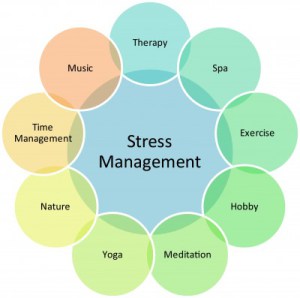Jill Fratianne
Recent Posts

April is National Stress Awareness Month and being aware of the stressors in your life and managing them effectively can make a huge difference in how you feel and in your overall health.
Stress can be defined as the brain's response to any demand. It is how your body reacts to mental, physical or emotional circumstances. Stress disturbs the normal functioning of the body. All of us experience stress. The human body is designed to experience stress and react to it. But stress is not always negative. Stress can be positive, keeping us alert and ready to avoid danger. Stress becomes negative when a person faces continuous challenges without relief or relaxation between challenges. As a result, the person becomes overworked and stress-related tension builds.
There are at least 3 different types of stress all which carry physical or mental health risks:
ROUTINE STRESS // Relates to the pressures of work, family and other daily responsibilities
CHANGE STRESS // Brought on by a sudden negative change, such as losing a job, divorce or illness
TRAUMATIC STRESS // Experienced in an event like a major accident, war, or a natural disaster, where one may be seriously hurt or in danger of being killed.
Everybody may feel stress in different ways, but the body responds to all types of stress similarly. For example, some people experience mainly digestive symptoms, while others may have headaches, sleeplessness, depressed mood, anger and irritability. People under chronic stress are prone to more frequent and severe viral infections, such as the flu or common cold, and vaccines, such as the flu shot, are less effective for them. Part of managing and coping with stress is RECOGNIZING STRESS.
Today's Takeaway: Challenge yourself to be more aware of your stress. Recognize it, recognize what triggered it, and write down the triggers.
Sources: http://www.webmd.com/mental-health/effects-of-stress-on-your-body; http://gammy-livelifelarge.blogspot.com/2011/09/stress-someone-rightly-said-that-stress.html; http://www.nimh.nih.gov/health/publications/stress/index.shtml
Milestone's Monday Munchie // Avocado Chocolate Mousse

Today's Monday Munchie is brought to you by Milestone Personal Trainer, Jonathan Jansen. For National Nutrition Month, we asked our Personal Trainers to share their favorite snacks, meals, desserts, etc. with you. Jonathan shared with us that his favorite snack is Avocado Chocolate Mousse. Sounds interesting, right? That's why we had to share more! We promise, you'll have no idea you're eating avocado! Chocolate avocado mousse actually proves that dessert can be good for you! Check out Giada De Laurentiis' recipe below.
Topics: Monday Munchies, Nutrition
Melanie's Favorite Avocado Stuffed Chicken Breasts
Topics: Nutrition
Milestone's Monday Munchie // Beginner's Luck Green Smoothie
Happy St. Patrick's Day! Wear green from the inside out and try this healthy GREEN smoothie! The Beginner’s Luck Green Smoothie from Simple Green Smoothies is a great starter smoothie for beginners. It’s full of iron, potassium and vitamins galore and tastes like a tropical treat!
INGREDIENTS
2 cups spinach, fresh
2 cups water
1 cup pineapple
1 cup mango
2 bananas
INSTRUCTIONS
Blend spinach and water until smooth. Next, add the remaining fruits and blend again.
Topics: Monday Munchies, Holidays, Nutrition

When we spring forward with Daylight Savings time, we gain an hour of daylight, but we lose an hour of sleep. Adjusting to the time change can take a heavy toll on our health and many of us feel sluggish the days following. Prepare today to feel better tomorrow.
Prepare your kids // Put them to bed 15 minutes early. Make their room darker. Continue your routine. Prepare for grumpiness. Use visual cues to help them know when it's ok to wake up. This blog goes into more detail about each of these suggestions and share's this clock that is color-changing, indicating when it's OK to wake up! If your kids are prepared, you'll be more prepared, too!
Go to Bed 15 Minutes Early // Going to bed just 15 minutes early will help minimize the impact of the time change.
Expose Yourself to Light in the AM // Natural light and fresh air will help you feel refreshed if you wake up groggy.
Get Some Exercise During the Day // Exercise in general helps you sleep better, but avoid exercise within 3 hours of bedtime.
Give Yourself a Sleep Break // If you feel tired days following the change, take a short nap in the afternoon, but not too close to bedtime. Avoid sleeping an hour longer in the mornings.
Avoid Stimulation // Avoiding stimulating substances and devices makes a big difference in how well you wind down and sleep. Alcohol and caffeine can interfere with sleep habits. Try putting down your iPad, phone, or shutting off your computer at least an hour before bed.
Eat Light at Night // Having too much in your stomach, especially fatty or spicy foods, can cause insomnia. Eat light and simple foods for dinner, several hours before bed. If you need a snack before bed, try a carbohydrate or dairy.
Fit Tuesday // Enjoying Mardi Gras Without the Calories
It's called Fat Tuesday for a reason. Mardi Gras celebrations are known for being over-the-top indulgent. Try these healthy versions of your Louisiana favorites and feel good about your Mardi Gras celebration! Celebrate your fitness journey and your small (or big!) successes on what we've deemed FIT TUESDAY!
Click each photo for the recipe!
Vegetarian Beans and Rice

Shrimp & Cheddar Grits & a Shrimp Po'Boy


Sausage Gumbo & Dirty Rice 

Do you have a favorite, healthy Mardi Gras recipe? Share it with us in the comments below or on our Facebook page and we'll share it with our members! Happy Fit Tuesday!






